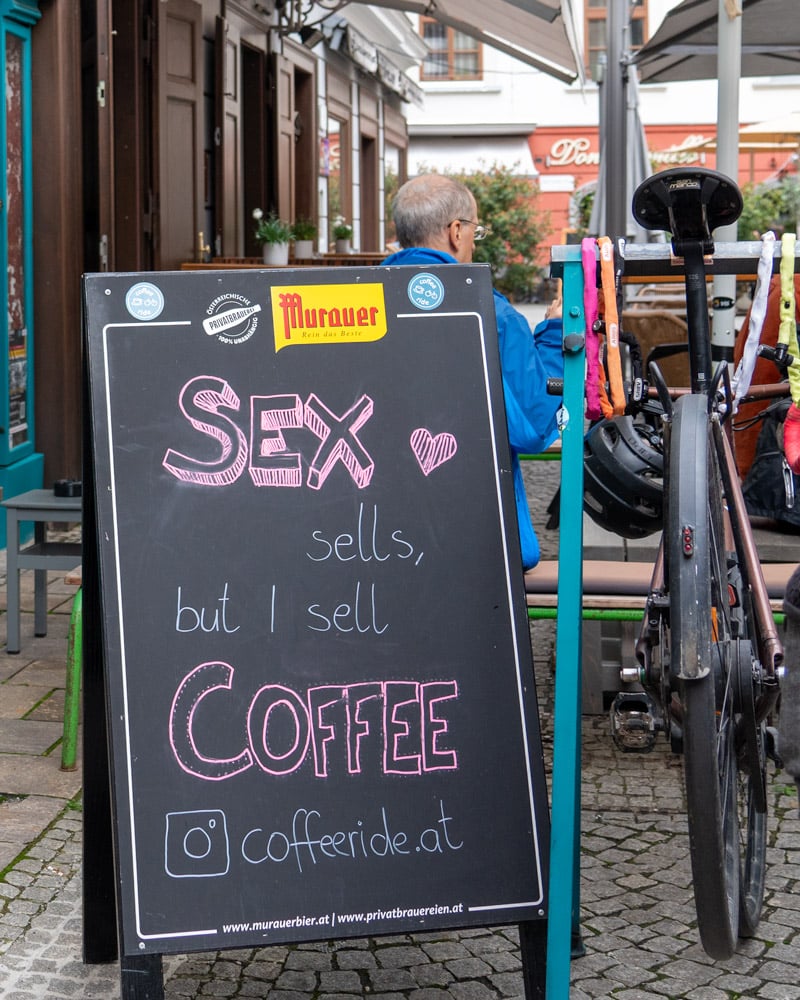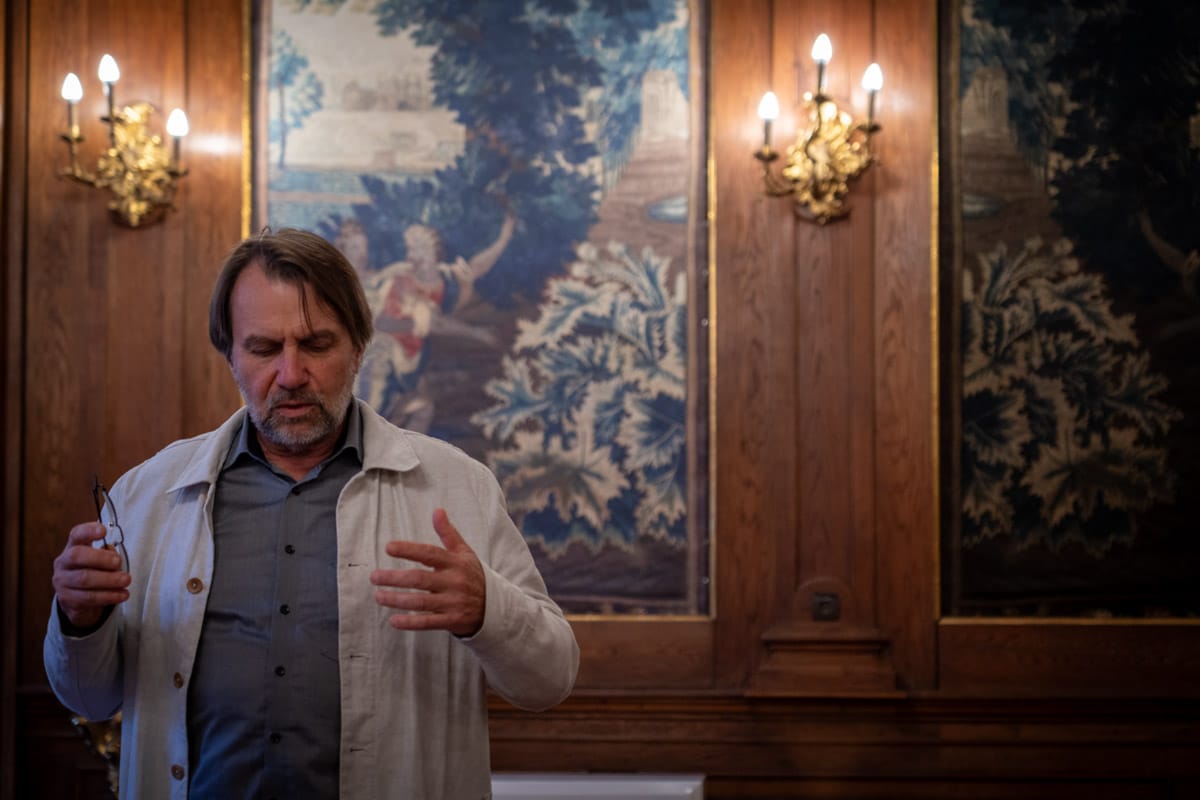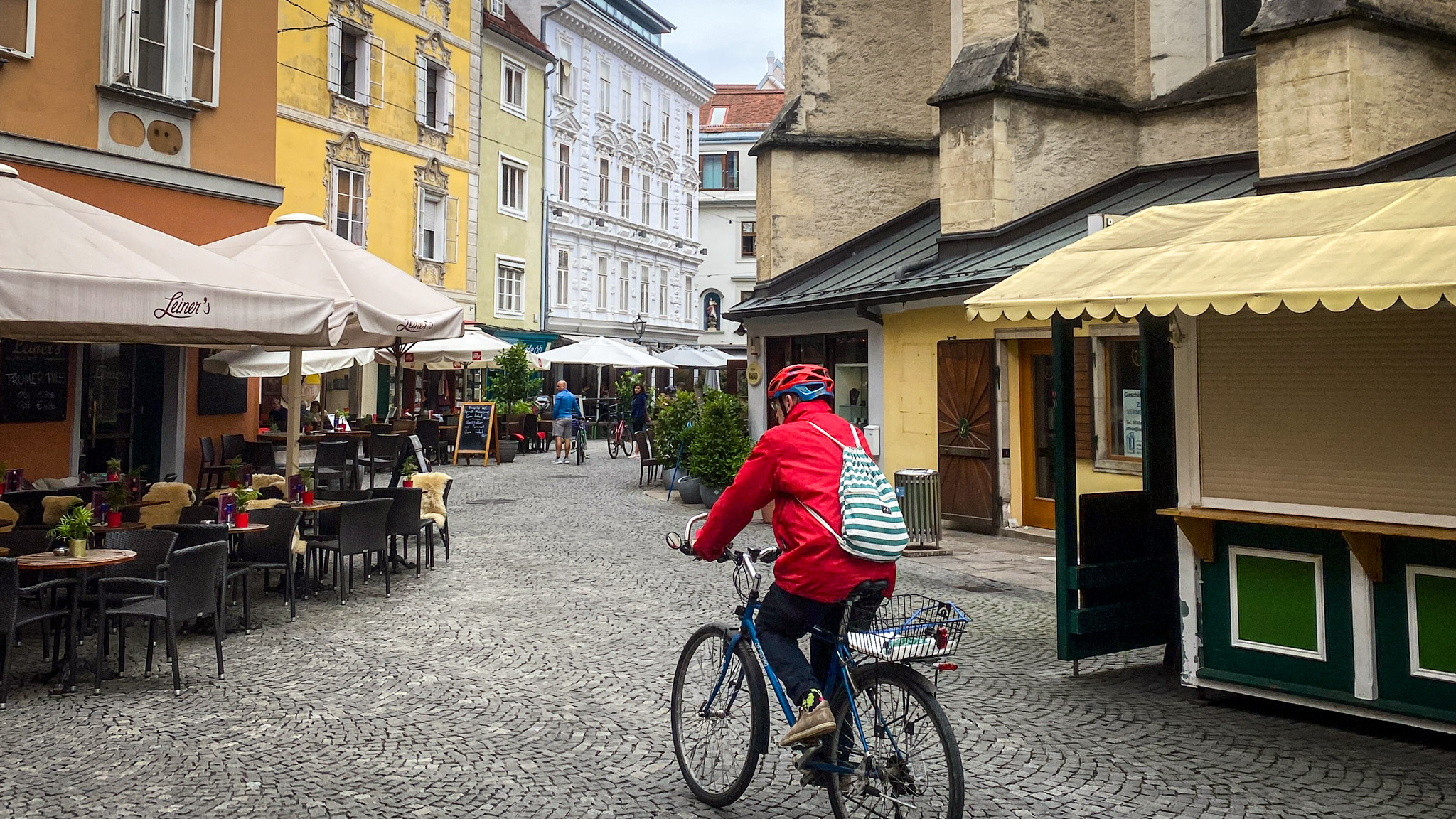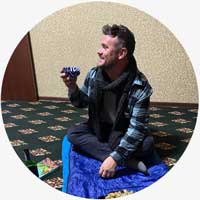Coffee, Concerts, Courtship & Community: Meet Graz’s Cyclists Creating “Austria’s Bicycle Capital”
This website uses affiliate links which may earn a commission at no additional cost to you. As an Amazon Associate I earn from qualifying purchases.
Updated: 29th August 2024
At 9:22 am, Eva Berghofer props open Coffee Ride’s door and slides across the serving window. Soon, caffeine-craving commuters, mostly on bicycles, pull up with an eager smile, parking their wheels on the pretty cobbled street. Not just seeking a morning coffee fix, these pedalling patrons come for their regular morning chat with Eva, something of star on Graz’s cycling circuit.
‘Sex sells, but I sell coffee’, reads the A-Frame in front of her cupboard-like coffee shop. Yet, Eva isn’t just selling a caffeine hit; she trades in conversation and community. Along with a cohort of bike-obsessed citizens, Eva’s homely cafe is one of many initiatives playing a sizeable role in propelling Graz, Austria’s second city, towards a two-wheel, community-driven future.
From reinventing classical concerts as city cycling tours to friend-making rides, dating on two wheels and sustainable-focused delivery services, Graz is on a mission to get more locals and visitors living their best life by bike. I recently returned to one of my favourite cities, and through conversations with three of the city’s cycling residents, I discovered how gorgeous, glorious and green Graz could soon be Austria’s bicycle capital.

“It’s very cool to cycle here as you’re out of the city in just a few minutes. If you’re a beginner, it’s better to go along the river to the south or north. If you go west and east, it’s really hilly. You could even go south to Slovenia and then back with the train. ”
–Eva Berghofer, Owner Coffee Ride

The “Bicycle Capital of Austria”
Sustainability in Graz has been a way of life for much longer than the term became travel’s new buzzword. The city’s green credentials are numerous, from electric trams and multiple farmers’ markets to the impressive fact that 60% of the city is green spaces, all elements you’ll soon notice on a weekend visit.
Yet Graz and the surrounding region – the state of Styria – have set their sights on a more human-powered future to complement the countless upcycling initiatives, sustainable transport options, and community-powered social impact projects.
Between 2021 and 2030, the local governments are ploughing 100 million euros into the mission of making Graz the “Bicycle Capital of Austria”. The already extensive cycle paths are being extended, additional cycling networks are being rolled out across the city and snaking out towards vineyards, mountains and oh-so-green countryside, and investments are being made in lighting cycle paths for safety, introducing e-bike charging infrastructure and constructing new bicycle parking.
Yet, as with everything in Graz, it’s rarely just an official-led approach. Community is at the core of how this city develops, and its citizens are stepping up to give their fellow residents and visitors to Graz an optimised two-wheel experience.
“It’s not like Vienna, a great city, but if you have a friend in another district, it probably takes hours to go there sometimes,” Eva explained while highlighting why Graz is such a bike-friendly city. “Here [in Graz], you can do it by bike or foot.”

“My colleagues come to work by cycling, and me too. We all are cyclists here in the city. We can do everything by cycling and by every weather – if we have one meter of snow, then I take the bus.”
–Mathis Huber, Intendant of Styriaarte

Coffee Rides & Community
“The sense of community is getting stronger here [in Graz]”, Eva declares moments before someone from next door arrives with a plate of mushrooms. She didn’t order them; it was just a neighbourly action from a nearby restaurant. And she should know; her one-year-old wholesome coffee shop is at Graz’s cycling core.
“Who said you have to open at 8 or 9 or half past?” she continues, as I look questionably at the cafe’s opening hours hand drawn on the door of the dark turquoise storefront.
“I open at 9.22 in the morning, and I close at seven past five. There is no real reason. Well, there is a small reason behind it, but it’s just because some customers open their shops at 10. So if I open at 9.30, it’s, yeah, maybe stressful. So 9.22 is eight more minutes… and it’s my birthday,” she continues, her infectious laughter punctuating each sentence.
With a fascinating life lived thus far – Eva was the first woman since 1495 to work in a local brewery before going teetotal and cycling across Vietnam – Eva’s Coffee Ride is arguably the best place to start getting to know Graz’s Old Town. And not only because of the quality organic coffee and delicious home-baked cakes she serves. Eva has raised Graz’s bike culture from sightseeing to community-seeking, running regular coffee rides and even bike dating events.
“In the road bike community, a coffee ride is a bike ride with friends, where it’s not about cycling faster, it’s not a training ride, it’s about communicating, socialising, and it’s a coffee ride,” Eva explains when I probe on both the name and main purpose of her cafe.
“I organise a coffee ride every Sunday [at 5:30] with two different groups, one 50k and one 100k. The 50k is an easy beginner-friendly ride, and the 100k is a motivated coffee ride.”
Is it only locals, I ask? “No, many tourists come as well. I’m glad that I have very good Google recommendations, and there is like a Facebook for everybody cycling, it’s [called] Strava.”
Not just content with getting all cycling locals and visitors together, Eva has recently turned her attention from coffee to courtship, launching single bike speed dating to help pair up potential partners on a casual park bike ride.
“It was just maybe three weeks ago, so let’s see,” Eva chuckles when I enquire if love had blossomed from the bike rides.

“Go to Sommeralm. It’s northeast of Graz. It’s a pasture. It’s really nice, it’s quiet there, and the cows are just everywhere – it’s beautiful and high up.”
–Eva Berghofer, Owner Coffee Ride
As Eva explained more about her life story, I learned that her original dream of a lounge-style coffee shop had come around 25 years ago. But it was only recently that she decided to go for it, putting community, coffee and cycling at the business’s core rather than trying to find a larger lounge-like space. In fact, her small space and terrace opposite the Franziskanerkirche was just a storage room when she moved in.
“There was no water, no real electricity. The first metre and pump were just mud. So there was nothing in here. But I fell in love with the window, and then I said, yeah for me, it’s big enough.”
In Eva’s own words, she didn’t open Coffee Ride to get rich; she simply didn’t want to skip over this long-awaited dream on her bucket list. It goes some way in explaining why Coffee Ride is a one-woman show. If Eva is away on a cycling adventure, whether to Slovenia or further afield – the UK is her next two-wheel journey – the shop remains shuttered. For her regulars, Eva and Coffee Ride are inseparable.
“My highlight of Graz?” I think the size. Because it’s nearly big enough to be a city, but small enough to be a village.” she explains while spinning her “prediction” wheel as I go to leave.
“It says you’ll fall in love,” she declares cheerily as I wave goodbye. Little did I know she meant the next day when I returned for a slice of those decadent home-baked chocolate cakes, freshly baked every Wednesday night.


Two Wheel Concerts
Graz’s cycling citizens aren’t just rethinking courtship. They’re also reimagining one of Austria’s most famed aspects: its classical concerts and orchestral culture. Every summer in Austria, different regions come alive with outside performances, yet one of Austria’s most fabled music festivals, Styriarte, founded in 1985, has reinvented itself even further by introducing Fahrradkonzerts, literally Bicycle Concerts.
“With the cycle concerts, we can show a big part of the city in one concert. We have five positions, and we go by bicycle from position to position together with 80 bicycles through the streets and become the king of the traffic,” Mathis Huber, Styriarte’s intendant for over two decades, tells me inside Palais Attems, the festival’s head office and central performance venue adorned with 17th century Belgium tapestries and eye-catching frescoes.
The idea behind re-launching part of the festival’s programme as two-wheel, multi-performance concerts was born from various factors: COVID, appealing to a new section of society, and embracing the excellent array of venues, nature and cycling tracks throughout Graz. It’s a bold departure from the longer, more traditional Baroque and Classical concerts that Nikolaus Harnoncourt, the famed Austrian conductor, founded Styriarte on.

Still, stringing together al fresco concerts in a bicycling-loving city like Graz is a breeze and offers visitors an alternative way to experience Austria’s scenery and renowned classical performances. Even at some permanent venues, a Fahrradgarderobe – a sort of coat check for bicycles – has been installed. Yet, for Mathis, it was equally important to make the arts more accessible.
“We have to be flexible, and we have to be to make experiments… If you have things such as the cycle concerts, that’s something for different people. Then, we establish a bigger or different bubble. Inclusion is one of the main interests of our work.”
This stride to be more appealing, accessible, and affordable is especially important in a city where one in five residents is a student. A policy that sees the highest-priced seats subsiding lower-priced tickets has also been introduced to avoid excluding parts of society and inadvertently creating a social bubble. Mathis may have spent 25 years leading Styriarte, but he remains loyal to Graz and his citizens first most, his family farm, and always cycling to work mindset (unless there’s a metre of snow, he tells me), keeping him firmly grounded in this almost countryside-like city’s way of life.

“I would recommend [cycling to] the south of Graz. Go to the Buschenschank Bockmoar. You’ll ride for around one and a half hours and then come by a nice lake, the Badesee Wildon, and then it goes steep up to the Puschenschank, which is in the hills, and it’s just a very nice place.”
–Jonathan Strallegger, Founder VeloFood

Sustainable Deliveries by Bike
When Jonathan Strallegger founded Velofood in 2016, it was the first sustainable delivery company in Graz. Inspired by similar operations he had seen in other cities, such as Berlin, he returned to his home city to launch a two-wheel delivery service that wasn’t only sustainable in its transport but also its culture.
“I was sure it would work. That food delivery could also be much more sustainable. So the idea that I had was to create a food delivery service where we only go with bicycle, where all the restaurants have to use only biodegradable packaging,” Jonathan tells me as we discuss how Graz and his company have evolved over recent years,
When COVID closed down social dining in Graz, Jonathan soon found that Velofood was more in demand than he could imagine. Now, with around 130 restaurants – they still have strict criteria for who they will and won’t work with – available on their app, 150 riders, and an ever-growing collection of eateries offering full reusable packaging, it’s fair to say the business has grown more than Jonathan could have imagined. Not that he’s always holed up in an office; it’s still very important for the founder to get out on his bike – both to support the team and also in his free time.
“I work a lot together with the riders. What is important to me is to be as transparent as possible,” he expands as we discuss how he ensures that the company is as sustainable for the workers as the meals.
“We actually have only 1-2% of our money that goes to marketing, and that’s how we have the chance to pay [the riders] a little bit better,” he adds, explaining how Austria’s slightly different self-employed rules and collective bargaining laws work. And it’s clearly working; staff retention is high – certainly aided by Graz being a student-heavy city – and post-COVID, Jonathan made a substantial donation to charity following an unexpected year of profit.
And what’s next for the 35-year-old founder? “It’s not planned to expand to any other city or to have a completely new project,” he tells me, agreeing with the point I’d heard from nearly all the makers I’d met in Graz: Graz is the perfect size city – so why would you want to move anywhere else?
This article was produced in partnership with Graz Tourism. All editorial content is, as always, my own.





Leave a Reply
Want to join the discussion?Feel free to contribute!